Updated 11 months ago
The Best Portable Solar Panels for 2025
Written by
Ben Zientara
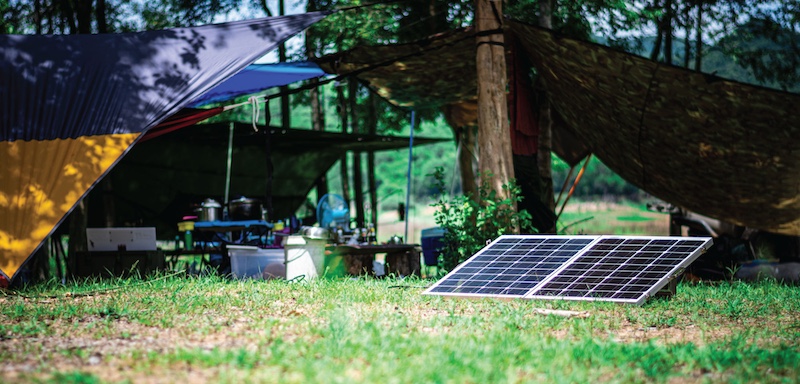
If you’re looking for the perfect solar panel to help keep your devices charged during all your outdoor activities, you’ve come to the right place. Here are our recommendations for the best portable solar panels in 2025:
Best packable solar panel: FlexSolar S60
Best 100W panel: BougeRV ISE192
Best 200W panel: Renogy RPP200EF-SE-US
Best 400W panel: Renogy RSP400LSC-US
The panels above represent a range of options to provide solar power on the go, from the very small 60-watt packable FlexSolar S60 to the very large and powerful 400-watt Renogy RSP400LSC-US.
Each of these foldable solar panels offers unique benefits, and you’ll want to consider the option that best balances your need for portability with power output. Most people will probably find the 200-watt Renogy panel hits the sweet spot.
Whether you’re looking for a portable power solution for your camper or just hoping to keep a small battery charged in a power outage, there is a panel here for you.
Best packable portable solar panel: FlexSolar S60
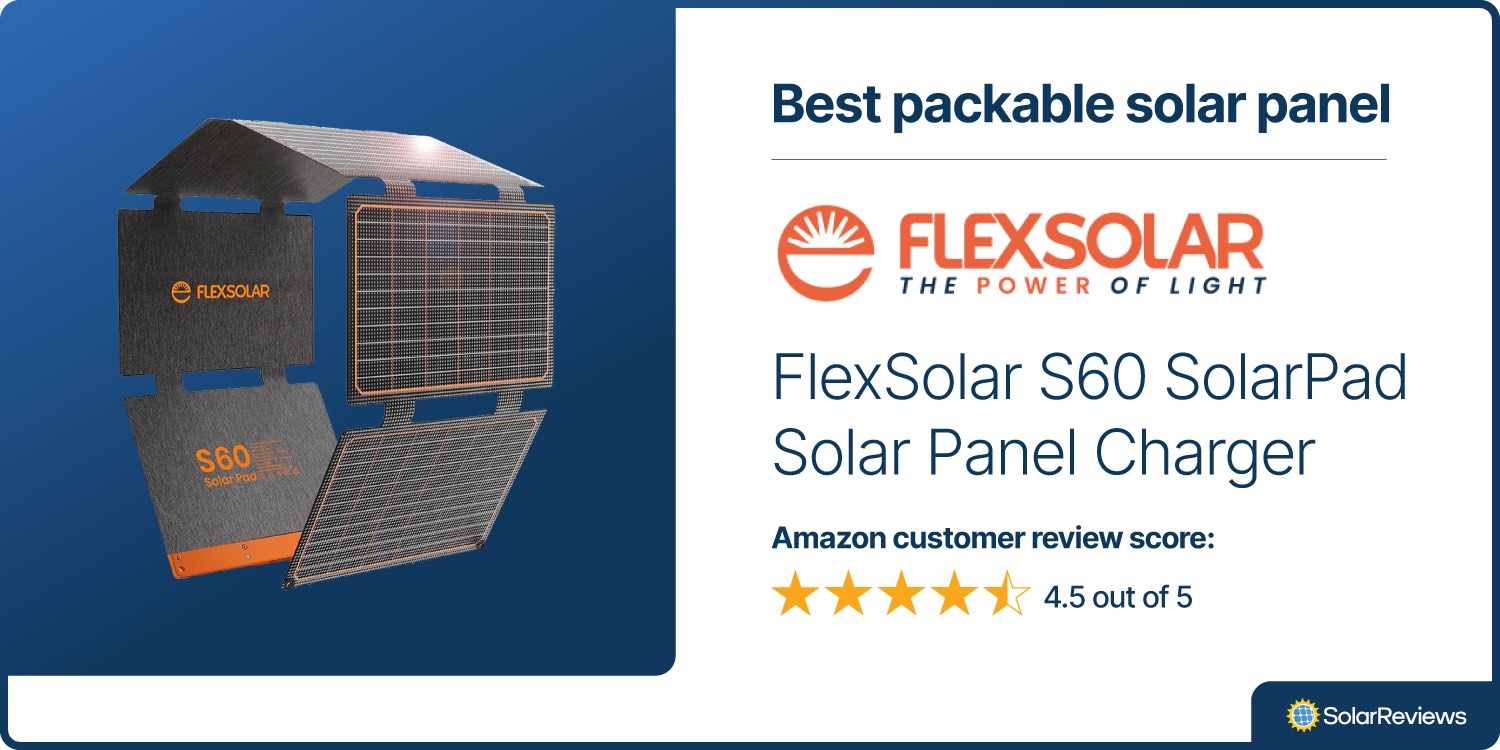
Pros
-
Ultra portable and lightweight
-
Has robust USB output options that use the QC and PD standards to output more power than competitors
-
Also includes extension cable to connect to multiple kinds of solar generators
Cons
-
12-month warranty only
-
60W won’t be enough for more than charging very small devices
In a world full of cheap solar panels for backpacking, FlexSolar’s 60-watt S60 solar panel stands out because of its quality and the variety of power outputs it offers.
Because it maxes out at 60 watts, the S60 puts out a usable amount of power even in low-light situations. The USB-A and USB-C outputs on the back allow for quick charging of smartphones and other devices, and the included multi-adapter cable can connect the S60’s DC output to portable power banks with either Anderson, XT60, or DC 5521 barrel inputs.
All of that makes this an excellent entry-level portable solar panel for charging devices like smartphones whenever there is sun or filling a small portable solar battery at your campsite with electrons while you’re hitting the trail. With its IP67 waterproof rating, the S60 can even handle a little rain.
The downside here is the 12-month warranty, but in this class of portable panels, this is the norm. If you demand a longer warranty, you can choose the Jackery SolarSaga 40W panel with a 5-year warranty, but we’ve found that customer reviews for the Jackery panel aren't as good.
Best 100 W portable solar panel: BougeRV ISE192
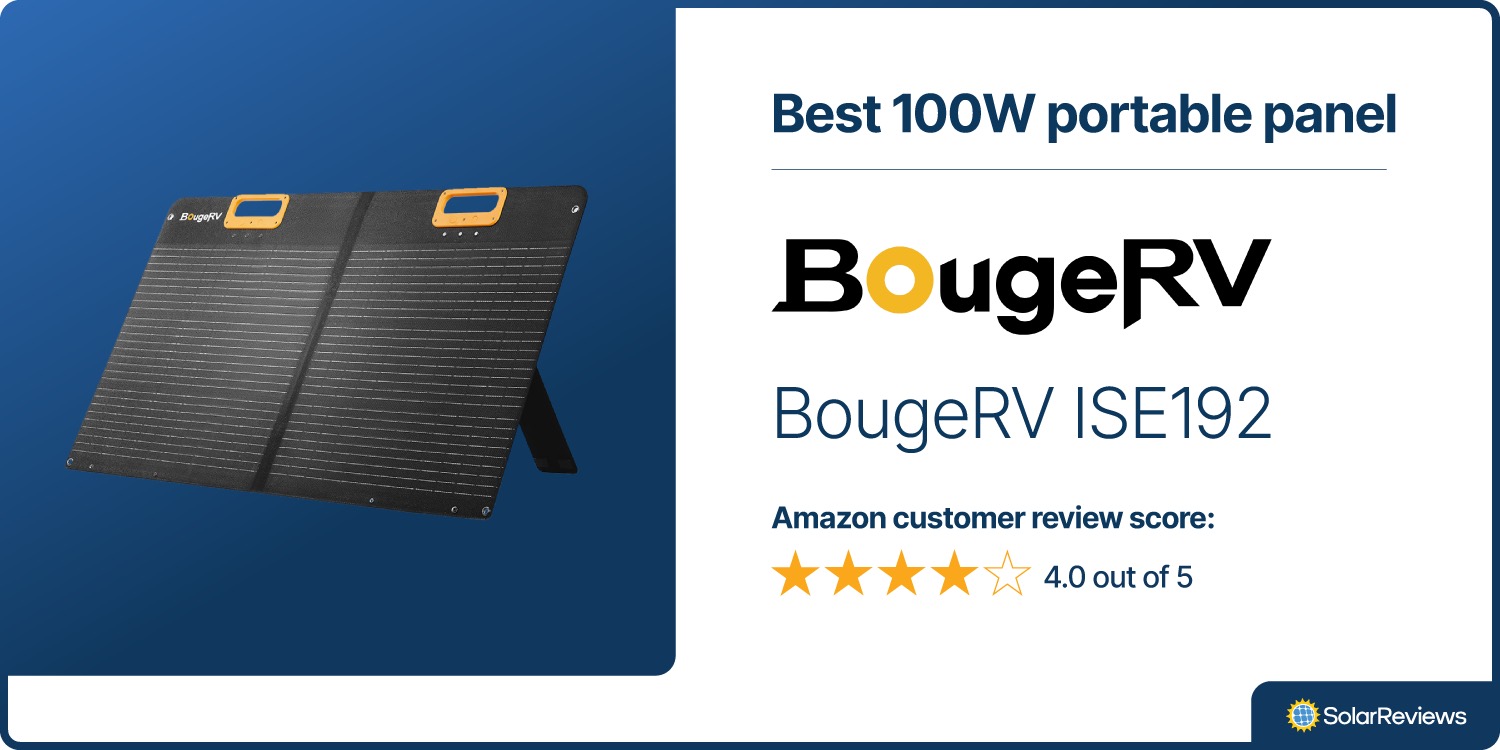
Pros
-
Foldable and portable at 10 lbs
-
IP67 waterproof
-
10-year warranty is unmatched in the portable solar panel world
Cons
-
More expensive than some other options
-
Only offers MC4 solar output
The BougeRV ISE192 portable solar panel won our "best portable panel" award in our roundup of the best 100-watt solar panels based on its mix of quality, portability, and especially its 10-year warranty. The 100-watt size is best for people who want to charge devices on longer camping trips
There are lots of portable 100-watt solar panels on the market, but this one comes from a big name company you can trust to be around during the warranty period, and not some fly-by-night Amazon or AliExpress company with all capital letters in its name.
The one downside of this panel is that it doesn’t offer any direct USB outputs on the back like some other companies do. Instead, it comes with MC4 solar connectors that you will need an extension cable to plug into a portable solar generator. If you need USB output, check out Jackery’s 100-watt portable panel.
Best 200W portable solar panel: Renogy RPP200EF-SE-US
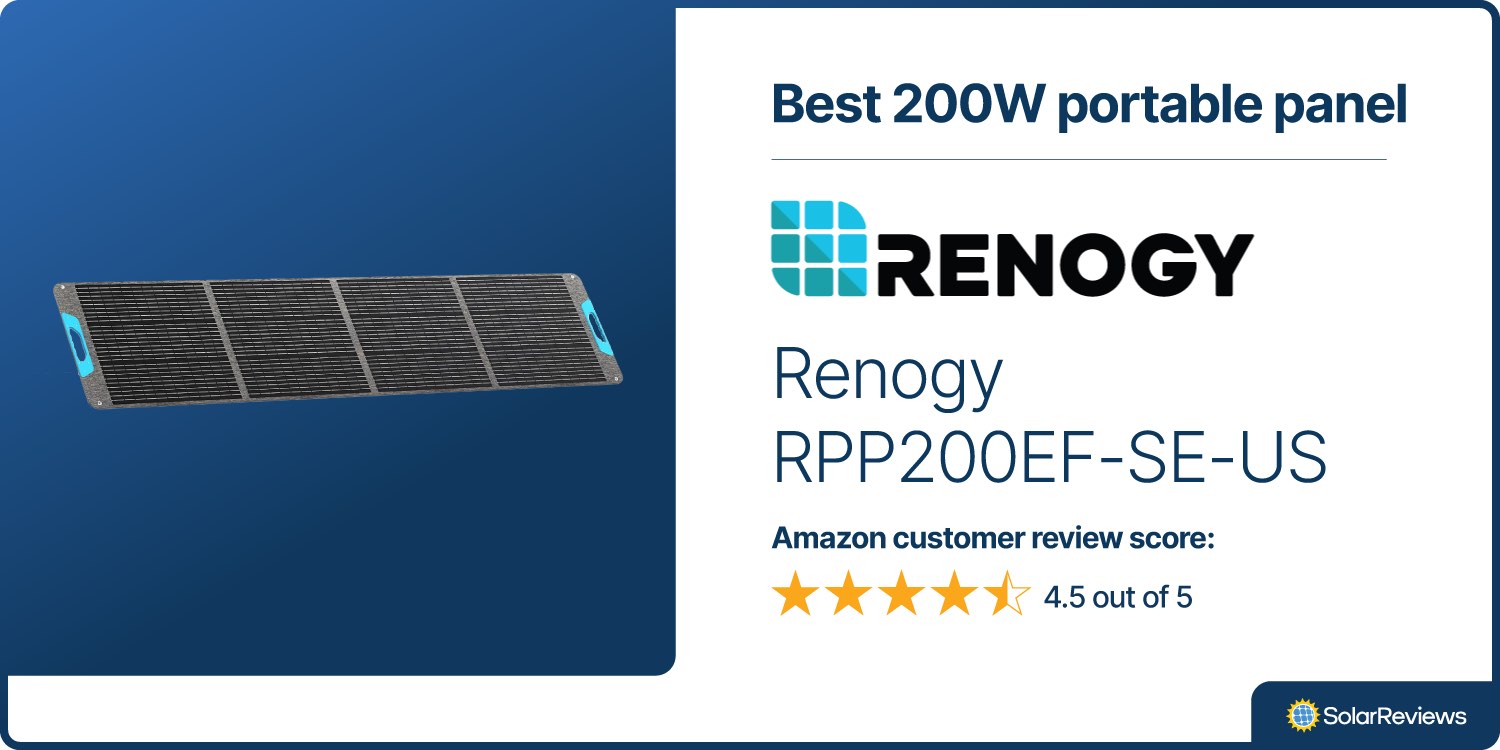
Pros
-
Foldable and portable at 17 lbs
-
Includes USB-A and USB-C ports next to the solar cables on the back
-
IP65 waterproof
-
Priced much better than similar folding panels from other manufacturers
Cons
-
Only comes with a 2-year warranty
The Renogy RPP200EF-SE-US tops our list of the best 200-watt solar panels, and also wins our award for best value of any portable solar panel. With a regular price of $235, the Renogy panel is a heck of a deal. Compared to similar options from Bluetti and Jackery, the Renogy is about half as expensive and offers much the same functionality.
The RPP200EF is just the right size for folding out and placing in a sunny spot, and its 200-watt rated power output under direct sunlight is enough to recharge a 1 kWh portable power station with one day of full sun. A 200W solar panel is what you need if you’re going to charge laptops or anything else more demanding than a smartphone.
The only drawback here is the relatively short 2-year warranty. To be clear, 2 years is standard coverage for foldable panels, but Renogy does offer a 5-year warranty on the 400-watt panel listed below, so we know they can do it.
Best 400W portable solar panel: Renogy RSP400LSC-US
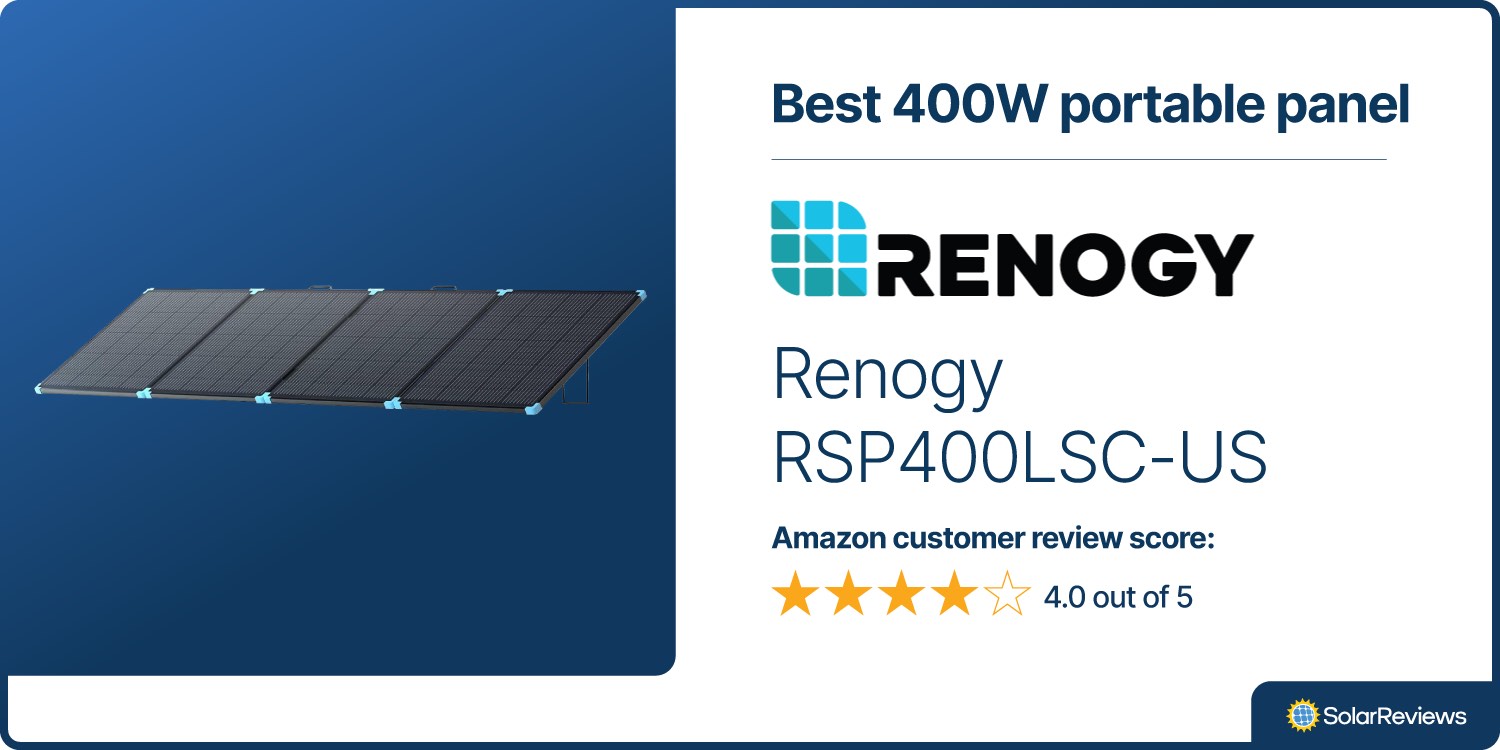
Pros
-
Sturdier construction than some other 400-watt options
-
5-year warranty from a trusted company
Cons
-
400 watts pushes the limits of portability
400 watts of solar is a lot to take on the go, and any 400-watt solar panel will stretch the meaning of the word "portable." At 30.2 lbs and just 27.9 by 33.7 inches when folded, the high-efficiency Renogy RSP400LSC-US is the closest you’ll get.
If you really need a portable panel, the 400-watt size is great for charging a larger power station in an off-grid setting like a small cabin or RV camp. This Renogy panel comes with a carrying case to protect the panel when not in use, so you can pack it into your RV or van alongside all your other outdoor gear.
We like this panel because it offers extra stability and sturdiness with a frame around each sub-portion of the panel, along with sturdy metal kickstands for positioning the panel on the ground and adjusting tilt. In our experience, these kickstands are preferable to the fabric-wrapped plastic legs of some other brands.
Like the 200-watt panel in our lineup above, the Renogy 400-watt panel offers a good value. Its MSRP is $999.99, but the sale price usually hovers between $550 and $650 (so keep your eyes peeled for sales). Those prices are around the same as those of other companies’ products, but the Renogy 5-year warranty sets this panel apart from the competition.
What to consider when buying portable solar panels
Choosing the right portable solar panel is a decision that involves balancing power output with weight, but there are a few other considerations as well. If you’re looking to store solar energy in lithium batteries, you need to choose the panel with the right output characteristics to match the battery. Let’s look at a few considerations below:
Portability
If you’re looking for a solar panel to take on a backpacking trip, choose something small and packable. The FlexSolar S60 folds into the shape of a mid-sized laptop, and weighs under three pounds, while the BougeRV ISE192 weighs 10 pounds and is twice as large when folded. You can find 100-watt solar panels that are smaller and less weighty, but you might discover that their quality leaves something to be desired.
Electrical characteristics
Wattage is only one part of the equation for a photovoltaic (PV) solar panel. If you’re looking to pair your panel with a portable power station, you need to make sure that the open circuit voltage (VOC) of the solar panel falls between the minimum and maximum input voltage of your power station.
All power stations will list a range of solar input voltages. For example, the Bluetti AC 180 has an input voltage range of 12–60 VDC.
The most important consideration is to NEVER exceed the maximum voltage of the solar input. Suppose the panel’s voltage is below the minimum input voltage for your battery. In that case, it will simply not charge the battery, but exceeding the maximum input voltage can irreparably damage your power station’s solar charge controller and render your expensive battery inoperable.
For example, the 200-watt Renogy panel in our list above has a VOC of 23.40V, meaning it must be connected to a solar charge controller with a maximum solar input of more than 23.4 volts. The Renogy panel would be appropriate to pair with the Bluetti AC 180, because the panel’s 23.4 VOC falls between the 12 and 60 volts the Bluetti accepts.
Make sure to take note of the VOC of the panel and input voltage of any portable battery you want to charge.
Components
Nearly all solar panels these days use monocrystalline silicon solar cells, which are the standard choice for semiconductor in solar panels. That said, there are some exciting thin film panels like the BougeRV Yuma solar panel that use a different semiconductor (in this case, copper indium gallium selenide, aka CIGS).
Other components to consider include the cables, ports, and materials used in the case and kickstands. If you’re just looking to charge a phone on the go, you may only need a single USB-C output, but if you want to use the panel to charge a battery, look for one that offers either a DC port or standard MC4 solar connectors.
Some panels come with sturdy metal kickstands while others have different types. All of them can work, but be sure to read customer reviews to see how other people feel about the materials used.
Portable solar panel FAQAre portable panels good for home backup?
Final word on portable solar panels
A portable solar panel can be a valuable asset if you’re out in the wilderness. We’ve listed our picks for the best ones up above, but the truth is: the best portable panel for you will be the one that meets your needs at the right price point, from a company you trust to deliver a good product and support in the future.
We think most people will find the 200-watt Renogy RPP200EF-SE-US lightweight portable solar panel to be the best and most flexible panel for a variety of needs. It offers excellent functionality with multiple power outputs, enough power to provide meaningful amounts of electricity to a portable solar battery, a reasonable weight of 17 lbs, and a good price point.
Whatever your needs, portable solar panels are meant to enable you to go out in the world and explore! We hope you now have the tools to choose the perfect panel to help you do just that.
Ben Zientara is a writer, researcher, and solar policy analyst who has written about the residential solar industry, the electric grid, and state utility policy since 2013. His early work included leading the team that produced the annual State Solar Power Rankings Report for the Solar Power Rocks website from 2015 to 2020. The rankings were utilized and referenced by a diverse mix of policymakers, advocacy groups, and media including The Center...
Learn more about Ben Zientara